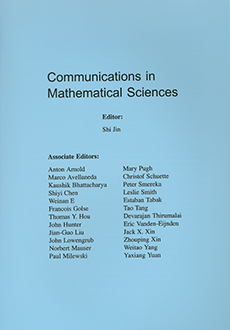Abstract
We consider the Liouville equations with highly heterogeneous Hamiltonians and their numerical solution by a time splitting algorithm. Such equations model the density of particles evolving according to the corresponding Hamiltonian dynamics as well as the propagation of high frequency waves with a wavelength much smaller than the correlation length of the random Hamiltonian. Our main results are on the relation between the time step used in the time splitting algorithm and the correlation length of the Hamiltonian. In order to fully resolve the Liouville equation, the time step must be chosen much smaller than the correlation length. However, we show that the time step can be chosen of the same order as the correlation length of the Hamiltonian when one is only interested in suitable statistical properties of the solution to the Liouville equation. We also present a more involved time splitting algorithm that allows us to take a time step independent of the correlation length.
Citation
Guillaume Bal. Lenya Ryzhik. "Time splitting for the Lioville equation in a random medium." Commun. Math. Sci. 2 (3) 515 - 534, September 2004.
Information





